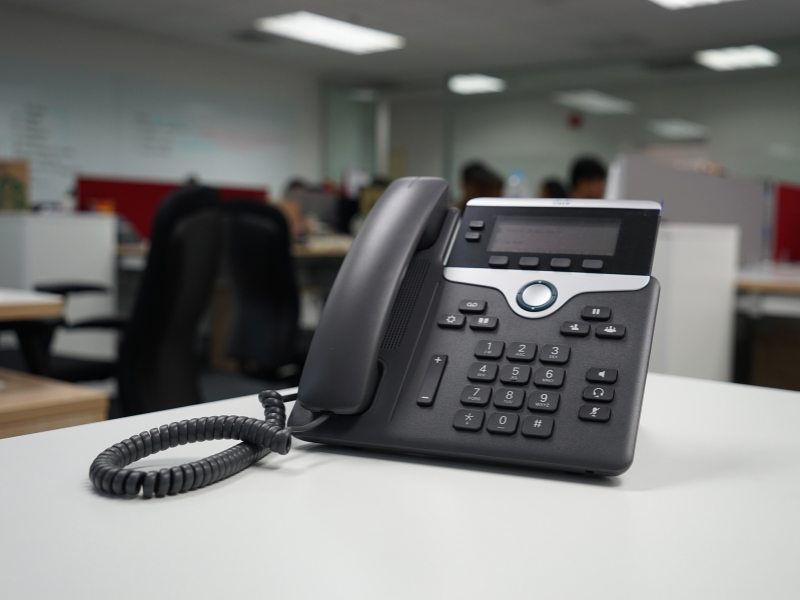Knowing exactly what a VoIP PBX system is can help your business decide which communication solution to get. If you want a dependable system that allows for voice calls to be made over the internet, consider migrating to VoIP PBX.
In this guide, we’ll walk you through the essentials of VoIP PBX, its advantages, distinctions from traditional PBX, and some tips on choosing the right provider.
Table of Contents

What Is a VoIP PBX System?
A VoIP PBX (Voice over Internet Protocol private branch exchange) is a business communication system that uses the Internet to connect phones and transmit voice data. It is a central hub for managing business phone calls and includes features such as call routing, virtual phone lines, auto-attendant, and conferencing. Since all users can share a specific number of phone lines, it saves businesses the cost of acquiring a line for each user.
Components of a VoIP System
A VoIP system has several main components:
IP Phones
VoIP PBX systems use IP phones, similar to traditional phones, but connect to the internet. These VoIP phones convert sound into data and send them over the internet. IP phones can take the form of a traditional phone connected to an adapter, a special VoIP phone, or software that runs on a mobile phone or computer.
Running the system on a computer requires using additional communication accessories, such as a headset or microphone.
PBX server
Think of the PBX server as the brain of the system. It manages communication functions such as call routing, voicemail, and transcription. In a VoIP PBX, the server is often hosted in the cloud instead of on-premise hardware.
Internet connection
Of course, you cannot run VoIP systems without a reliable internet connection. This ensures that communication channels are clear and smooth. The Federal Communications Commission recommends a high-speed broadband connection through a cable modem, DSL, or local area network (LAN). It’s best to consult the VoIP PBX service provider for the recommended bandwidth requirements.
VoIP Gateway
The VoIP gateway is a device that converts voice and multimedia signals from analog phone networks into data packets for transmission over an IP network and vice versa. It allows traditional telephone systems to connect with VoIP networks.

Advantages of VoIP PBX Systems
Now that you know the components and meaning of VoIP PBX, let’s discuss why more businesses prefer it as their PBX:
Businesses can save on costs
VoIP PBX usually has a lower upfront cost compared to analog PBX. You don’t need extensive hardware to use it. Moreover, many providers offer flexible pricing and pay-as-you-go subscriptions.
Easily scalable
VoIP PBX systems are highly scalable, which means you can easily add or remove features. If your business needs fluctuate or grow, VoIP PBX can adapt quickly. You only need to talk to your service provider, and they’ll handle the upgrades (or downgrades) for you.
Provides flexibility
Employees can connect to a VoIP PBX system anywhere with an internet connection. It can support remote work, work-from-home, and hybrid setups. You’re no longer dependent on on-premise equipment to collaborate with colleagues.
Access to advanced features
VoIP PBX systems are equipped with features that go beyond traditional telephony. If you need video conferencing, voicemail with transcription, call recording, and more (without breaking the bank), then this is the best solution for you.

Differences Between Traditional and VoIP PBX Systems
Traditional PBX, which uses analog phone lines, and VoIP PBX vary in many ways:
Infrastructure
Traditional PBX relies on physical hardware and analog phone lines, usually found on-site. VoIP PBX operates digitally and uses the internet. There’s minimal need for hardware except if you prefer using physical VoIP phones.
Cost
Traditional PBX systems require higher upfront costs for hardware, installation, and physical space. VoIP PBX systems usually have lower initial expenses since you only need the software and an internet connection to make it work.
Flexibility
VoIP PBX offers greater flexibility, allowing team members to communicate in different locations. Traditional PBX systems may struggle to accommodate non-traditional work setups since they rely on on-premise hardware.
Maintenance
Traditional PBX requires ongoing maintenance and updates. You need a dedicated IT team or third-party vendors to ensure that phone lines stay connected. VoIP PBX systems, especially if cloud-hosted, shift the responsibility to service providers and free up your resources.
Choosing the Right VoIP PBX System Provider
Before choosing a provider, consider the following:
Business needs
Assess the features required to run your business smoothly and compare these with the features offered by service providers. For instance, some providers offer only basic VoIP features such as phone lines and call routing. Meanwhile, iFax business VoIP PBX already includes advanced features such as HIPAA compliance, internet fax, local and toll-free numbers, and conferencing at an affordable price.
Service reliability
If you want uninterrupted communication, choose reputable service providers. Ask the sales team about their infrastructure, data privacy, and security policies. It’s best to check online reviews from nonbiased sources and ask for suggestions from fellow business owners.
Customer support
When technical problems, security incidents, and other unexpected circumstances arise, you need a service provider that can offer timely support. Choose a provider like iFax, which can give you 24/7 live support.
Trial periods and contracts
Many service providers offer trial periods so you can test their services. Take advantage of these to evaluate the system’s compatibility with your business. Moreover, review contract terms and privacy policies carefully, considering factors like lock-in periods, data privacy, or termination policies.
Additional Reading: VoIP vs Analog Phone Lines Comparison







